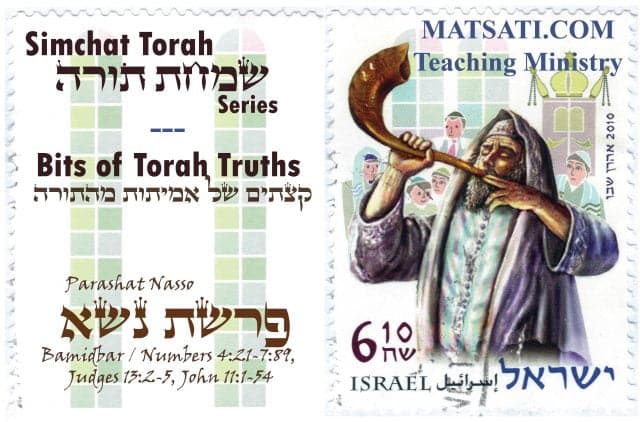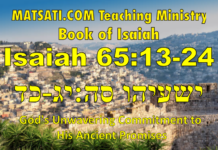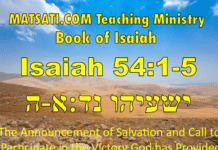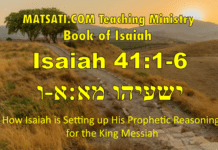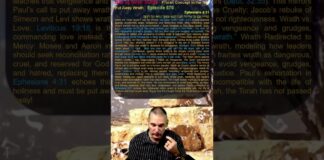[youtube url=”https://www.youtube.com/watch?v=GATCjaUa7Cc&feature=youtu.be”]
This weeks reading is from Parsahat Nasso (Bamidbar / Numbers 4:21-7:89). the Lord speaks to Moshe telling him to number the Levites (the sons of Gershon) including the fathers of their household by their families. Following the numbering of the Levites, the Lord commands the people to put outside of the camp (city) the person who is unclean, the Leper, and every person having a discharge of the skin (5:1-4) so the camp is not defiled. The Lord requires justice of His people saying when a person sins he is to make restitution by confessing his sin and then adding one-fifth and giving it to the person that he has wronged. The scriptures then describe what to do if a man’s wife is unfaithful (5:12), the husband and wife go to the Tabernacle and make an offering of jealousy. (5:13-15). The Scriptures continue in detailing the requirements of the one who makes the vow of a Nazarite: (i) do not drink wine, vinegar, strong drink or anything from the fruit of the vine, (ii) do not shave the head, and (iii) do not touch anything dead (6:1-21) throughout the entire length of their vow. The rabbinic ruling (see Rambam’s Mishneh Torah) is that if one violates one of these three things, the time line of the vow must be restarted again. Following the Nazarite vow, the Lord tells Moshe to have Aaron bless the people (6:22-26) and the Lord gives the liturgy of the Aaronic blessing. Moshe then constructs the Tabernacle and consecrates it (7:1-11). Each tribe participates in the dedication ceremony, the description of the dedication is repeated twelve times, one per day for each of the tribes of Israel totaling twelve days. The Scripture reading concludes detailing the total number of animals offered as sacrifices for the dedication of the altar of God.
In this week’s reading, we are looking at Bamidbar / Numbers 5:11-16. This section of the reading describes unfaithfulness between a husband and wife (5:12). The interesting aspect of these Scriptures is that there are a prescribed set of instructions on what to do when a husband finds or believes his wife to be unfaithful. However, we do not find any instructions regarding when the wife finds her husband to be unfaithful. טו וְהֵבִיא הָאִישׁ אֶת-אִשְׁתּוֹ אֶל-הַכֹּהֵן וְהֵבִיא אֶת-קָרְבָּנָהּ עָלֶיהָ עֲשִֹירִת הָאֵיפָה קֶמַח שְֹעֹרִים לֹא-יִצֹק עָלָיו שֶׁמֶן וְלֹא-יִתֵּן עָלָיו לְבֹנָה כִּי-מִנְחַת קְנָאֹת הוּא מִנְחַת זִכָּרוֹן מַזְכֶּרֶת עָוֹן: 5:15 the man shall then bring his wife to the priest, and shall bring as an offering for her one-tenth of an ephah of barley meal; he shall not pour oil on it nor put frankincense on it, for it is a grain offering of jealousy, a grain offering of memorial, a reminder of iniquity. (NASB)
ספר במדבר פרק ה
א וַיְדַבֵּר יְהוָֹה אֶל-מֹשֶׁה לֵּאמֹר: יב דַּבֵּר אֶל-בְּנֵי יִשְֹרָאֵל וְאָמַרְתָּ אֲלֵהֶם אִישׁ אִישׁ כִּי-תִשְֹטֶה אִשְׁתּוֹ וּמָעֲלָה בוֹ מָעַל: יג וְשָׁכַב אִישׁ אֹתָהּ שִׁכְבַת-זֶרַע וְנֶעְלַם מֵעֵינֵי אִישָׁהּ וְנִסְתְּרָה וְהִיא נִטְמָאָה וְעֵד אֵין בָּהּ וְהִוא לֹא נִתְפָּשָֹה: יד וְעָבַר עָלָיו רוּחַ-קִנְאָה וְקִנֵּא אֶת-אִשְׁתּוֹ וְהִוא נִטְמָאָה אוֹ-עָבַר עָלָיו רוּחַ-קִנְאָה וְקִנֵּא אֶת-אִשְׁתּוֹ וְהִיא לֹא נִטְמָאָה: טו וְהֵבִיא הָאִישׁ אֶת-אִשְׁתּוֹ אֶל-הַכֹּהֵן וְהֵבִיא אֶת-קָרְבָּנָהּ עָלֶיהָ עֲשִֹירִת הָאֵיפָה קֶמַח שְֹעֹרִים לֹא-יִצֹק עָלָיו שֶׁמֶן וְלֹא-יִתֵּן עָלָיו לְבֹנָה כִּי-מִנְחַת קְנָאֹת הוּא מִנְחַת זִכָּרוֹן מַזְכֶּרֶת עָוֹן: טז וְהִקְרִיב אֹתָהּ הַכֹּהֵן וְהֶעֱמִדָהּ לִפְנֵי יְהוָֹה:Bamidbar / Numbers 5:11-16
5:11 Then the Lord spoke to Moses, saying, 5:12 ‘Speak to the sons of Israel and say to them, ‘If any man’s wife goes astray and is unfaithful to him, 5:13 and a man has intercourse with her and it is hidden from the eyes of her husband and she is undetected, although she has defiled herself, and there is no witness against her and she has not been caught in the act, 5:14 if a spirit of jealousy comes over him and he is jealous of his wife when she has defiled herself, or if a spirit of jealousy comes over him and he is jealous of his wife when she has not defiled herself, 5:15 the man shall then bring his wife to the priest, and shall bring as an offering for her one-tenth of an ephah of barley meal; he shall not pour oil on it nor put frankincense on it, for it is a grain offering of jealousy, a grain offering of memorial, a reminder of iniquity. 5:16 ‘Then the priest shall bring her near and have her stand before the Lord, (NASB)
In the MT, we read the following: טו וְהֵבִיא הָאִישׁ אֶת-אִשְׁתּוֹ אֶל-הַכֹּהֵן וְהֵבִיא אֶת-קָרְבָּנָהּ עָלֶיהָ עֲשִֹירִת הָאֵיפָה קֶמַח שְֹעֹרִים לֹא-יִצֹק עָלָיו שֶׁמֶן וְלֹא-יִתֵּן עָלָיו לְבֹנָה כִּי-מִנְחַת קְנָאֹת הוּא מִנְחַת זִכָּרוֹן מַזְכֶּרֶת עָוֹן: 5:15 the man shall then bring his wife to the priest, and shall bring as an offering for her one-tenth of an ephah of barley meal; he shall not pour oil on it nor put frankincense on it, for it is a grain offering of jealousy, a grain offering of memorial, a reminder of iniquity. (NASB) The MT states וְהֵבִיא אֶת-קָרְבָּנָה “and you shall bring an offering.” The husband is to bring a “korbanah” with him when he brings his wife to make an accusation against her before the Lord. In the Tanach and later Judaism, the korban is known as a reference to “what is offered” to the Lord God in heaven upon the altar (Bamidbar / Numbers 7:3). According to the Torah, there are various kinds of offerings, not just the sacrifices of animals (e.g. grain offering). Similarly, Judaism has the same general usage with the addition of the term “korban” also being a way of referencing a vow-formula when something is offered to the Lord. The concept here in Bamidbar / Numbers 5:15 is for the case of the grain offering, the grain was first given in secular usage, but now as a “korban,” it has been transferred or dedicated to the service of the Lord. The korban being referenced to something that is subject to a transfer of control, being given over to the Levites, the Temple, and unto God. In the first century context, the korban (Κορβᾶν) may have taken the form of a personal renunciation, or by a means of denying others the use of one’s possessions. Such is the example that is given according to the gospel of Mark 7:10-16.
Mark 7:10-16
7:10 ‘For Moses said, ‘Honor your father and your mother’; and, ‘He who speaks evil of father or mother, is to be put to death’; 7:11 but you say, ‘If a man says to his father or his mother, whatever I have that would help you is Corban (that is to say, given to God ,’ 7:12 you no longer permit him to do anything for his father or his mother; 7:13 thus invalidating the word of God by your tradition which you have handed down; and you do many things such as that.’ 7:14 After He called the crowd to Him again, He began saying to them, ‘Listen to Me, all of you, and understand: 7:15 there is nothing outside the man which can defile him if it goes into him; but the things which proceed out of the man are what defile the man. 7:16 [‘If anyone has ears to hear, let him hear.’] (NASB)10Μωϋσῆς γὰρ εἶπεν, Τίμα τὸν πατέρα σου καὶ τὴν μητέρα σου, καί, Ὁ κακολογῶν πατέρα ἢ μητέρα θανάτῳ τελευτάτω: 11ὑμεῖς δὲ λέγετε, Ἐὰν εἴπῃ ἄνθρωπος τῷ πατρὶ ἢ τῇ μητρί, Κορβᾶν, ὅ ἐστιν, Δῶρον, ὃ ἐὰν ἐξ ἐμοῦ ὠφεληθῇς, 12οὐκέτι ἀφίετε αὐτὸν οὐδὲν ποιῆσαι τῷ πατρὶ ἢ τῇ μητρί, 13ἀκυροῦντες τὸν λόγον τοῦ θεοῦ τῇ παραδόσει ὑμῶν ἧ παρεδώκατε: καὶ παρόμοια τοιαῦτα πολλὰ ποιεῖτε. 14Καὶ προσκαλεσάμενος πάλιν τὸν ὄχλον ἔλεγεν αὐτοῖς, Ἀκούσατέ μου πάντες καὶ σύνετε. 15οὐδέν ἐστιν ἔξωθεν τοῦ ἀνθρώπου εἰσπορευόμενον εἰς αὐτὸν ὃ δύναται κοινῶσαι αὐτόν: ἀλλὰ τὰ ἐκ τοῦ ἀνθρώπου ἐκπορευόμενά ἐστιν τὰ κοινοῦντα τὸν ἄνθρωπον. 16Καὶ
In the example that is given by Yeshua, this type of korban (Κορβᾶν) had been used to breach relations within a family which has significant implications. The idea is found within the context of what Yeshua is saying, the person states he is bringing korban for the purpose of disregarding the command to honor your mother and father. This is paralleled to Mark 7:21 ‘For from within, out of the heart of men, proceed the evil thoughts, fornications, thefts, murders, adulteries, 7:22 deeds of coveting and wickedness, as well as deceit, sensuality, envy, slander, pride and foolishness. 7:23 ‘All these evil things proceed from within and defile the man.’ (NASB) Within the context of Mark 7, it is because of wickedness and sin that proceeds from one’s heart that one brings a korban under the pretense of not having to honor mother and father. In the debate between Yeshua, the scribes, and the Pharisees, Yeshua’s accusation is that the scribes uphold a vow (a korban) taken by a son even though it releases him from all obligations to his parents. The idea here is with regard to the weightiness of a command, what command would supercede another? Which command is greater and thus takes precedence? The Scribal-Pharisaical argument is taken from Parashat Mattot, Bamidbar / Numbers 30:2-3, saying that vows to the Lord God take precedence over one’s obligation to men. The point being missed was if the Scribes truly wanted to obey the Torah, they should not forget that God’s love and justice coincide with His concern for human life and welfare. Therefore, taking care of one’s mother and father in old age takes precedence over bringing a sacrifice to the Tabernacle/Temple, and for that matter, to make a korban (gift) to one’s parents was the act of separating something as holy in service to the Lord. Thus, taking a korban and giving it to one’s parents would have equally been performed under the fulfilment of the command, as a sacrifice unto the Lord. A korban did not have to burn upon the altar in order for it to be considered a true korban (gift) to God. Note also in Matthew 27:6, the silver pieces Judas returned to the Temple, the chief priests decided the returned money was not suitable for korbanas (κορβανᾶς), for the temple treasury, even though Judas had put them in the temple and the money most likely originating from the Temple treasury. The reason that is provided in the Matthew account is that “this is blood money” and hence it is unclean for korbanas (κορβανᾶς).
These concepts follow through in Yeshua’s teaching regarding the korban and the man who had an issue with his brother according to Matthew 5:21-46.
Matthew 5:21-46
5:21 ‘You have heard that the ancients were told, ‘You shall not commit murder’ and ‘Whoever commits murder shall be liable to the court.’ 5:22 ‘But I say to you that everyone who is angry with his brother shall be guilty before the court; and whoever says to his brother, ‘You good-for-nothing,’ shall be guilty before the supreme court; and whoever says, ‘You fool,’ shall be guilty enough to go into the fiery hell. 5:23 ‘Therefore if you are presenting your offering at the altar, and there remember that your brother has something against you, 5:24 leave your offering there before the altar and go; first be reconciled to your brother, and then come and present your offering. 5:25 ‘Make friends quickly with your opponent at law while you are with him on the way, so that your opponent may not hand you over to the judge, and the judge to the officer, and you be thrown into prison. 5:26 ‘Truly I say to you, you will not come out of there until you have paid up the last cent. 5:27 ‘You have heard that it was said, ‘You shall not commit adultery’; 5:28 but I say to you that everyone who looks at a woman with lust for her has already committed adultery with her in his heart. 5:29 ‘If your right eye makes you stumble, tear it out and throw it from you; for it is better for you to lose one of the parts of your body, than for your whole body to be thrown into hell. 5:30 ‘If your right hand makes you stumble, cut it off and throw it from you; for it is better for you to lose one of the parts of your body, than for your whole body to go into hell. 5:31 ‘It was said, ‘Whoever sends his wife away, let him give her a certificate of divorce’; 5:32 but I say to you that everyone who divorces his wife, except for the reason of unchastity, makes her commit adultery; and whoever marries a divorced woman commits adultery. 5:33 ‘Again, you have heard that the ancients were told, ‘You shall not make false vows, but shall fulfill your vows to the Lord.’ 5:34 ‘But I say to you, make no oath at all, either by heaven, for it is the throne of God, 5:35 or by the earth, for it is the footstool of His feet, or by Jerusalem, for it is the city of the great King. 5:36 ‘Nor shall you make an oath by your head, for you cannot make one hair white or black. 5:37 ‘But let your statement be, ‘Yes, yes’ or ‘No, no’; anything beyond these is of evil. 5:38 ‘You have heard that it was said, ‘An eye for an eye, and a tooth for a tooth.’ 5:39 ‘But I say to you, do not resist an evil person; but whoever slaps you on your right cheek, turn the other to him also. 5:40 ‘If anyone wants to sue you and take your shirt, let him have your coat also. 5:41 ‘Whoever forces you to go one mile, go with him two. 5:42 ‘Give to him who asks of you, and do not turn away from him who wants to borrow from you. 5:43 ‘You have heard that it was said, ‘You shall love your neighbor and hate your enemy.’ 5:44 ‘But I say to you, love your enemies and pray for those who persecute you, 5:45 so that you may be sons of your Father who is in heaven; for He causes His sun to rise on the evil and the good, and sends rain on the righteous and the unrighteous. 5:46 ‘For if you love those who love you, what reward do you have? Do not even the tax collectors do the same? (NASB)
Note that we need to look at 25 verses to get the context of Yeshua’s words. Notice how Yeshua is drawing together many concepts in Matthew 5 in his teaching, murder and being angry with your brother (5:21-22), adultery and the thoughts or our hearts (5:27-28), of giving a certificate of divorce to one’s wife (5:31-32), making a vow and false vows (5:33-37), and being good to our enemies (5:39-46), suggesting that all of these things may be connected. Now take note of Parashat Naso on the context of the Levites (priesthood) making right with property stollen, making a vow, one’s wife and unfaithfulness, construction of the Tabernacle and its dedication. Can you see a sort of parallel here within these topics between Yeshua’s words and this week’s Torah portion? Yeshua’s statement about divorce naturally draw us to the Torah portion (Parashat Naso) and the concepts of the korbanah (קָרְבָּנָה) found in Bamidbar / Numbers 5:15. Note how Yeshua says in Matthew 5:23 ἐὰν οὖν προσφέρῃς τὸ δῶρόν σου ἐπὶ τὸ θυσιαστήριον κἀκεῖ μνησθῇς ὅτι ὁ ἀδελφός σου ἔχει τι κατὰ σοῦ 5:23 ‘Therefore if you are presenting your offering at the altar, and there remember that your brother has something against you, (NASB) using the word δῶρόν (doron). The word δῶρόν (doron) means “gift” and generally is a replacement word for קָרְבָּן and also for מִנְחָה (gift, grain) and שֹׁחַד (bribe). If a parallel might be taken from this Greek word, notice how the word δῶρόν (doron) for “gift or grain” is a replacement word for קָרְבָּן, and its usage in the Apostolic Writings gives us the expression of honor, Matthew 2:11, and of sacrifices and of other gifts offered to the Lord God, in Matthew 5:23; Matthew 8:4; Matthew 15:5; Matthew 23:18; Mark 7:11; Hebrews 5:1; Hebrews 8:3; Hebrews 9:9; Hebrews 11:4. In addition, this word is also used of money cast into the treasury for the purposes of the temple and for the support of the poor. (Luke 21:1). What we appears to be coming out of this study is all of these concepts on the korban draws us to honoring one’s parents, one’s spouse, and our relationship with the Lord God in heaven. With Yeshua’s words in Mark 7 coupled with Matthew 5, we find that one needs to deal with sin before bringing the korban. Could this be the intent of the Torah text on bringing a korban when you bring your wife to make accusation before the Lord at the Tabernacle/Temple? The sins that proceed from one’s heart holds a very weighty position before God especially in the context of the korban, and most importantly between a husband and wife.
The importance of rooting out sin that is coupled with the korban is discussed by the rabbis in the Mishnah Pesachim 3:7 and Bava Kamma 9:12.
Mishnah Pesachim 3:7
If one is walking to go and slaughter his Pesach sacrifice, [or] to circumcise his son, [or] to attend a betrothal meal at the home of his father-in-law, and he remembers that he has chametz in his home; if he can return, destroy [it], and return to his mitzva, he should return and destroy [it]; and if not, he must annul it in his heart. [If one is walking to go and] save [people] from armed foes, or from the [flooding of a] river, or from robbers, or from fire, or from the collapse of ruined buildings, he must annul [the chametz] in his heart; and if [he is walking to go and] set up his optional Shabbat rest [so as to allow for himself a different area within which he may walk on Shabbat], he must return immediately [to destroy his chametz.ההולך לשחוט את פסחו, ולמול את בנו, ולאכול סעודת ארוסין בבית חמיו, ונזכר שיש לו חמץ בתוך ביתו – אם יכול לחזור ולבער ולחזור למצותו, יחזור ויבער. ואם לאו – מבטלו בלבו. להציל מן הגיס, ומן הנהר, ומן הלסטים, ומן הדלקה, ומן המפלת – יבטל בלבו. ולשבות שביתת הרשות – יחזור מיד.Mishnah Bava Kamma 9:12
If he gave the money to the men of the priestly watch and then died, his inheritors cannot take it out of their, as it says, “Whatsoever a man gives to a priest shall be his” (Numbers 5:10). If he gave the money to Yehoyariv, and the guilt-offering to Yedayah [the first and second two weekly divisions of the 24 Temple divisions], he has fulfilled his obligation. If he gave the guilt-offering to Yehoyariv and the money to Yedayah: if the guilt-offering still remains, the sons of Yedayah shall offer it; and if not, he must bring another guilt-offering. For one who brings what he had stolen before he brings his guilt-offering, has fulfilled his obligation. If he brought his guilt-offering before he brought what he had stolen, he has not fulfilled his obligation. If he gave the principal but not the fifth, the fifth does not prevent [him from offering the guilt-offering]. נתן את הכסף לאנשי משמר ומת אין היורשים יכולין להוציא מידם שנאמר איש אשר יתן לכהן לו יהיה נתן הכסף ליהויריב ואשם לידעיה יצא אשם ליהויריב וכסף לידעיה אם קים האשם יקרבוהו בני ידעיה ואם לא יחזיר ויביא אשם אחר שהמביא גזלו עד שלא הביא אשמו יצא הביא אשמו עד שלא הביא גזלו לא יצא נתן את הקרן ולא נתן את החמש אין החמש מעכב.
In the Mishnah Pesachim 3:7 speaks of the one who is bringing a korban for the Pesach sacrifice and remembers that he has chametz in his home, he needs to stop, return home, remove the chametz, and then return to bring the korban before the Lord. Chametz or leaven are various substances which are known to have fermenting properties which are added to bread for causing the bread to raise by the production of CO2. The leaven described in Scripture consisted of a lump of old dough in a high state of fermentation, which is then mixed into the mass of dough prepared for baking. The Torah forbids the use of leaven in all offerings made to the Lord by fire. During the Pesach feast, we are told to put away every particle of leaven from the house. The most prominent idea associated with leaven is its connection to corruption that is found within the bread making process and thereby its connection to the sin that is in our lives. In the Pesach sacrifice, the rabbis speak of before bringing a sacrifice before God, one needs to deal with the sin that is in one’s heart (one’s house). And we know according to the rabbinic literature and the Torah (study Parashat Noach) that the word for house (beit, בית) may also be a reference to the heart (the inside of a man). The rabbis knew and understood the issue of sin and the sacrifice as we read Yeshua expounding upon in Matthew 5:21-46.
It is this property of leaven which Yeshua points out when speaking of the “leaven (the corrupt doctrine) of the Pharisees and of the Sadducees,” (Matthew 16:6) and what the Apostle Paul speaks of in 1 Corinthians 5:7 saying the “old leaven;” coupled with the Mishnah, if one remembers chametz (sin), one must first destroy it before going before the Lord with the Pesach Lamb. Similarly, by reason of bringing a korbanah before the Lord while bringing one’s wife to make accusation against her, one must carefully examine and remove the chametz that is in one’s own life and heart and relationship. In the Mishnah Bava Kamma 9:12, the rabbis discuss what is stolen, and returning the gift that was stolen before bringing the gift (Korbanah) that belongs to the Lord. Making write with what is stolen takes precedence, is weightier, than the gift given to the Lord God in heaven. By a parallel thought, the wrong that is done between husband and wife needs to be remedied prior to coming before the Lord as described in Bamidbar / Numbers 5:11-16.
In Parashat Naso, the MT states, טו וְהֵבִיא הָאִישׁ אֶת-אִשְׁתּוֹ אֶל-הַכֹּהֵן וְהֵבִיא אֶת-קָרְבָּנָהּ עָלֶיהָ עֲשִֹירִת הָאֵיפָה קֶמַח שְֹעֹרִים לֹא-יִצֹק עָלָיו שֶׁמֶן וְלֹא-יִתֵּן עָלָיו לְבֹנָה כִּי-מִנְחַת קְנָאֹת הוּא מִנְחַת זִכָּרוֹן מַזְכֶּרֶת עָוֹן: 5:15 the man shall then bring his wife to the priest, and shall bring as an offering for her one-tenth of an ephah of barley meal; he shall not pour oil on it nor put frankincense on it, for it is a grain offering of jealousy, a grain offering of memorial, a reminder of iniquity. (NASB) The MT states וְהֵבִיא אֶת-קָרְבָּנָה “and you shall bring an offering.” The husband is to bring a “korbanah” with him when he brings his wife to make an accusation against her before the Lord. The point of bringing the korbanah as a minchat offering (מִנְחַת), is found within the details of the Hebrew text. We are told this is a grain offering of jealousy, no frankincense is to be placed upon it. The grain offering is a gift of memorial (מִנְחַת זִכָּרוֹן) and a reminder of iniquity (מַזְכֶּרֶת עָוֹן). The point of bringing the offerings is to remind one of the Torah command and of sin. The whole point of bringing the minchat was to remind one of their own chametz (sin). The man is bringing accusation against his own flesh and blood (his wife), and bringing a korbanah (קָרְבָּנָה). All of these Torah concepts that we have discussed, of sin in our hearts, and the bringing accusation against one’s wife, of vows that were made before God, or relationship between others and the Lord, etc appears to follow through from wickedness and sin that proceeds from one’s heart and the one who brings a korban under the pretense of not having to honor mother and father, and in this case, not having to honor one’s wife. Not giving honor and respect to another may have lead to the unfaithfulness that has occurred between husband and wife.
Now the question is whether the korbanah that is brought in Bamidbar / Numbers 5:11-16 is valid if one holds sin in one’s heart and life? What about our going before the Father in heaven in the Name of His Son Yeshua the Messiah, while keeping sin in the heart and in life? The Torah portion this week provides us of a picture of the unfaithfulness that we have towards the Lord God in heaven when we sin. The commandment in the Torah on the bringing of a gift while bringing one’s wife is not meant to be a harsh and crewel ruling as some would say regarding the Lord, under the presupposition that the Torah, “THE LAW,” is cold, hard, and unmerciful. The point of the Torah command is to draw all of these concepts into context of our relationships with both man and the Lord God in heaven. The Lord has given His Torah for the purpose of our drawing back to him, in the commands, and in the words of Yeshua, to ponder our relationships with both man and God, so we can maintain a focus upon mercy, justice, peace, and righteousness, because these are the things the Lord wants us to live by. Ask the Lord to help you overcome the desires of the heart, and to create in you a new heart, one that is wholly devoted to the Lord, and to mercy, justice, peace, and righteousness. Because these are the things that consist of Simkhat Torah (“The Joy of Torah”)! Let’s Pray! BTT_Parashat Naso-2015
